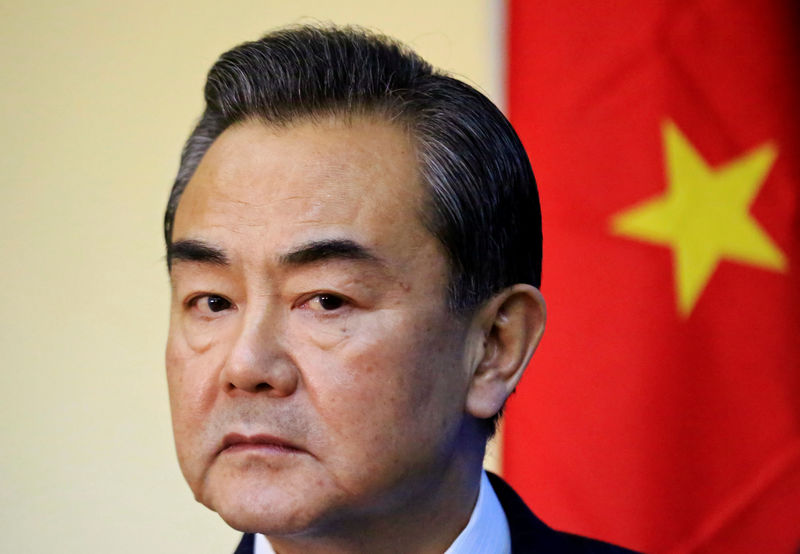By Ben Blanchard and Christian Shepherd
BEIJING (Reuters) - He has been likened to a "silver fox" in China's state media. Online, his looks and staunch defense of Chinese interests has won him a loyal following. Foreign diplomats say he can be suave and charming, as well as tough.
Foreign Minister Wang Yi, 63, China's public voice on international affairs, cuts a colorful figure next to China's usually staid diplomats, speaking out on the South China Sea and defending Beijing's position on North Korea.
He has been taking an increasingly high profile as Beijing becomes more assertive on the global stage.
Diplomatic sources believe the well-briefed and confident Wang is destined for bigger things, and could take over later this year as China's top diplomat from State Councillor Yang Jiechi, 67, Wang's predecessor.
Yang outranks Wang but tends to avoid the spotlight and is widely expected by foreign diplomats to retire around the time of this autumn's Communist Party congress.
"He's China's star," said a senior Beijing-based Asian diplomat, who has met Wang several times.
A career diplomat, Wang had been seen as another low-key Chinese official until a 2013 encounter with Australia's foreign minister, Julia Bishop.
In front of reporters in Beijing, he accused Canberra of "jeopardizing bilateral mutual trust" in a dispute over the East China Sea, the type of message for a fellow diplomat usually shared behind closed doors.
A senior Australian official later described it as the rudest thing he'd encountered in 30 years of diplomacy, Australian media reported.
Wang, who with his salt-and-pepper hair stands out among aging Chinese officials who often favor jet-black dye jobs, has been on a roll since then, raising eyebrows with his bluntness.
"Owing to China's traditional economic ties with North Korea, it will mainly be China paying the price for implementing the resolution," Wang said this month after the United Nations imposed new sanctions on Pyongyang.
A former ambassador to Japan, Wang speaks Japanese but is less confident in English.
He won plaudits in domestic media last year for standing up for China after losing his temper during a visit to Canada when pressed by a reporter about human rights, saying the question was unacceptable and calling her arrogant and irresponsible.
"Other people don't know better than the Chinese people about the human rights condition in China," he said.
In Beijing, he presides over occasional promotional events for Chinese provinces at the Foreign Ministry, inviting members of the diplomatic corps to hear about China's advances in places like Inner Mongolia. A western diplomat said the briefings were meant to show he also had China's domestic interests at heart.
"He's very well briefed and can talk in detail about issues without referring to notes. But he can also be very tough," added the diplomat, who has been in closed-door meetings with Wang about North Korea, the South China Sea and other subjects.
Wang's reputation for standing up for Chinese interests has won him a growing profile on social media.
After his outburst in Canada, he got hundreds of supportive posts on Tianya, a popular online bulletin board.
"Support Minister Wang's performance! I hope China can produce even more politicians of that caliber," wrote one poster called "Storm Destroyer".
There is even a page on Douban, a site better known in China for movie reviews, for people to express their admiration for his looks.
State media, often kept on a tight rein in making personal comments about Chinese officials, has been known to call him "shuai da shu", or "handsome uncle", equivalent to the term "silver fox" in English for attractive older men.
Neither the Communist Party's Organisation Department, which oversees personnel decisions, nor the State Council Information Office, responded to questions about Wang's promotion prospects.
MAN ABOUT MANILA
Wang also appears unafraid to talk to reporters, rare in a country where many officials refuse to answer questions at media briefings.
At the Association of South East Asian Nations meeting in Manila this month, Wang took center stage, engaging with journalists in multiple daily appearances.
At the meeting, he wooed - or shunned - other diplomats to hammer home China's positions on North Korea and the South China Sea, giving time to his North Korean counterpart, while a meeting with his Vietnamese opposite number was unceremoniously canceled.
Wang spoke to reporters five times on his first day of bilateral meetings in Manila. He gave public briefings on both days of the event and was quick to weigh in on breaking developments.
Asked why Wang was going to such lengths to speak to the media, one Chinese official said it was a matter of reputation: "We need to make sure China's voice is heard."
After meeting Foreign Minister Taro Kono of Japan, Wang said that his Japanese counterpart's comments on the South China Sea had "disappointed" China.

"I told him he had very done a good job of accomplishing the task the United States set him," he told reporters dryly.